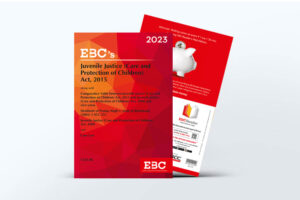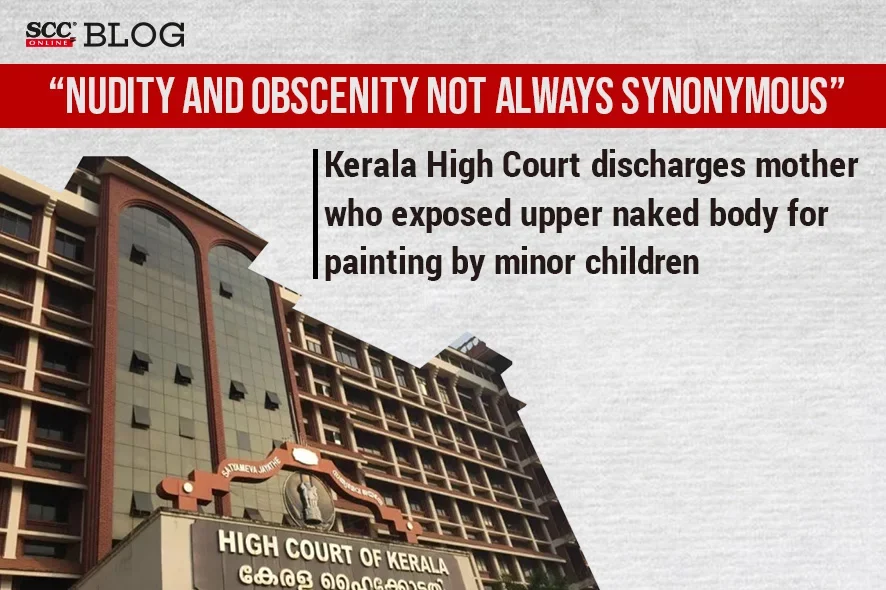Kerala High Court: In a revision petition challenging Trial Court’s dismissal of application for discharge by a mother accused of offences under Sections 10, 9(n), 14, 13(b) and 15 of the Protection of Children from Sexual Offences Act, 2012 (‘POCSO’), Sections 67-B(a), (b), (c) of the Information Technology Act, 2000 (‘IT Act’), and Section 75 of the Juvenile Justice (Care and Protection of Children) Act, 2015 (‘JJ Act’) for exposing her upper naked body to her minor children in the name of ‘body art’, Kauser Edappagath, J. discharged the mother saying that none of the allegations could be satisfied in the instant matter.
The petitioner, a 33-year-old woman posted a video on several social media platforms with her two minor children (boy aged 14 and girl aged 8 years) painting on her semi-nude upper body carrying the hashtag ‘Body Art and Politics’. The audience considered the same to be an obscene and vulgar act, posting the same for the world to watch, after which, the police registered a criminal case against her. Based on final report by Police the Trial Court dismissed her application for discharge under Section 227 of Criminal Procedure Code, 1973 (‘CrPC’) on the presumption of committing the offence, which has been challenged in the instant matter.
The Court said that the video was viewed in the Open Court showing 14-year-old son painting a phoenix on his mother’s upper body between her breasts and around the nipples, while the little girl was painting on a paper. The Court also pin-pointed at the message in the same video which conveyed that “naked body is the response to a controlling, sexually frustrated society”, while challenging default sexualization of female body. The Court observed her long history of fight against patriarchy and hyper-sexualization of women in society, starting with ‘Kiss of Love’ movement in 2014 to the recent example of participation in Sabarimala case, while further observing that “There is nothing on record to even remotely indicate that the petitioner did the said act with any sexual intent.”
The Court regarded the instant case as one wherein, a mother in an attempt to challenge the patriarchal stereotypes with a message that there is nothing sexual or offensive about the naked female body, exposed her kids to her semi-nude body, got charged with criminal prosecution for allegedly exploiting her own children of sexual gratification. In the Court’s opinion, “What started as a body art project for a mother with her kids with control of the narrative turned out to be a ‘criminal act’.”
While pressing on the bodily autonomy through the tagline of prochoice movement in the early 70’s, i.e., ‘My Body, My Choice’, the Court expressed that
“it continues to be an expression of the rights women deserve and is still consistently utilized by women right’s activists across the globe as a powerful retaliation to sexist societal ideas and archaic patriarchy.”
The Court further explained its point that
“Every individual is entitled to the autonomy of his/her body, this is not selective on gender. But we often find this right is diluted or denied to the fairer sex. The autonomy of the male body is seldom questioned, while the bodily autonomy of women is under constant threat in a patriarchal structure.”
The Court scrutinized Section 9(n) read with Section 10 of POCSO Act to be attracted when a child’s relative commits sexual assault on the child, involving ‘touch with sexual intent’ being the sine qua non for application of Section 7 of POCSO Act.
The Court did not find anything wrong with a mother allowing her body to be used as a canvas to be painted by her children in order to sensitize them to view nude bodies normally and not mere sexual objects. Thus, the Court discarded ingredients of Section 9(n) r/w 10 of the POCSO Act and further rejected presumption under Sections 29 and 30 of POCSO Act, lack of sexual gratification as per Section 13(b) and 14 of POCSO Act or storage of pornographic material involving children under Section 15 of POCSO Act. The Court also rejected any ‘sexually explicit acts’ as per IT Act, and Section 75 of JJ Act due to lack of ‘assault or abandonment of the child’.
The Court referred to Joseph Shine v. Union of India, (2019) 3 SCC 39 and K.S. Puttaswamy (Privacy-9J.) v. Union of India, (2017) 10 SCC 1 regarding bodily autonomy. It further relied on catena of cases including Aveek Sarkar v. State of W.B., (2014) 4 SCC 257, Bobby Art International v. Om Pal Singh Hoon, (1996) 4 SCC 1 and Director General, Directorate General of Doordarshan v. Anand Patwardhan, (2006) 8 SCC 433 regarding examination of nudity and the message it wants to convey.
The Court explained its standing that
“Even though the idols of all Goddesses are bare-chested, when one prays at the temple, the feeling is not of sexual explicitness but of divinity….. We often find men walking around without wearing shirts. But these acts are never considered to be obscene or indecent.”
The Court strongly opposed the idea of tying nudity to sex saying that depiction of naked upper female body should not be deemed to be sexual/obscene/indecent/sexually explicit.
As regards the stand of children, the Court expressed that “The children are exposed to prosecution against their own mother contrary to their wishes.”
The Court found it in the best interest of victims, i.e., children, to discontinue the prosecution. The final report, in the Court’s conclusion, did not support or draw a prima facie case for the offences alleged, and the Trial Court completely overlooked the context of the video in question. Therefore, the Court discharged the petitioner in the instant case.
[XXX v. State of Kerala, 2023 SCC OnLine Ker 3673, Order dated 5-6-2023]
Order by: Justice Kauser Edappagath
Advocates who appeared in this case :
For Petitioner: Advocate Renjith B. Marar, Advocate Lakshmi N. Kaimal, Advocate Arun Poomulli, Advocate Aiswarya Thankachan, Advocate Meera Joppan;
For State: Public Prosecutor T.V. Neema.
Buy Juvenile Justice (Care and Protection of Children) Act, 2015 HERE







